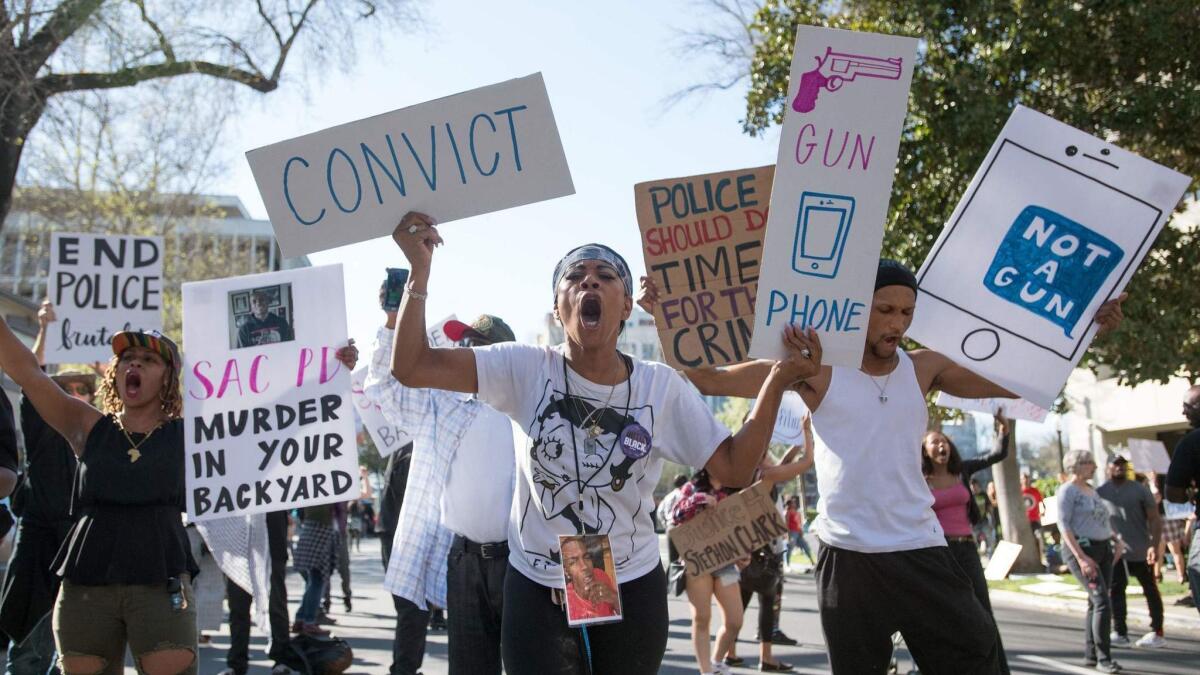Lawmakers again take aim at California’s tight lid on police shooting investigations

- Share via
Reporting from Sacramento — After police killed an unarmed black man in Sacramento earlier this month, California legislators are poised to again try to loosen some of the nation’s strictest prohibitions on the release of officer shooting and misconduct investigations.
State Sen. Nancy Skinner (D-Berkeley) plans to introduce a bill next week that would require the disclosure of investigations of serious uses of force, including police shootings.
For the record:
6:40 p.m. March 30, 2018A previous version of this article said Stephon Clark was 23. He was 22.
The legislation, which civil rights groups across the state support, is necessary because people have a right to know how law enforcement treats those cases, said Lizzie Buchen, a legislative advocate for the American Civil Liberties Union of California.
“Currently, the public is completely shut out of the entire disciplinary process,” Buchen said. “When an officer kills someone, which is an extreme example of their ability to use force, the public has no way of actually knowing how it was handled by that agency.”
California has some of the most stringent laws against disclosing police personnel records. Most information about discipline is presumed confidential, even when complaints are determined to be valid. California’s rules are so rigorous that last year a state appellate court ruled the Los Angeles County Sheriff’s Department isn’t even allowed to tell prosecutors the names of deputies with confirmed cases of misconduct. The California Supreme Court is now reviewing that case.
Over the years, lawmakers have tried to open up some information. But law enforcement groups have fought back, arguing that disciplinary records should remain private to protect officer safety and limit the sensationalizing of such incidents.
The latest attempt came in 2016 under growing pressure from civil rights activists to respond to disputed police shootings in Ferguson, Mo., San Francisco, Los Angeles and elsewhere. An effort from former state Sen. Mark Leno (D-San Francisco) was shelved in a Senate committee after intense lobbying from law enforcement groups.
No state legislator proposed a bill on the issue last year, and Leno has said the police lobby is so strong that it might take a statewide ballot measure for the law to change.
This year, the union that represents professors and lecturers in the California State University system is supporting Skinner’s bill. Buchen said she expects other labor groups to join, which would broaden the list of organizations that have supported similar legislation.
The latest legislation, which has been planned for months, has taken on new urgency since the March 18 killing of 22-year-old Stephon Clark by Sacramento police, Buchen said. Clark’s death has sparked daily protests in the capital city after police shot him in his grandmother’s backyard during a vandalism investigation while he was unarmed and carrying a cellphone. Under current law, the Sacramento Police Department investigation won’t become public except through any potential criminal prosecution of the officers or civil litigation against the city.
About two dozen representatives from civil rights groups and relatives of those killed by police rallied before a meeting of the state’s anti-police racial profiling board in Compton Thursday morning. They called on lawmakers to pass Skinner’s legislation and increase police accountability provisions.
“We are going to demand justice,” Melina Abdullah, a professor of Pan-African Studies at Cal State L.A. and a member of the Black Lives Matter movement, said at the rally. “We are going to pass this bill as a first step in ending the murders of our people.”
Besides opening access to use of force investigations, Skinner’s proposed bill would also require the disclosure of confirmed cases of sexual assault and lying while on duty.
Representatives with the California State Sheriffs’ Assn., California Police Chiefs Assn. and the Peace Officers Research Assn. of California — the state’s largest police labor organization — declined to comment on the legislation. All three groups and two dozen other law enforcement and labor organizations opposed Leno’s bill two years ago. Brian Marvel, the labor group’s president, said public safety groups planned to meet with Skinner next week.
“We’re trying to work with the senator to find some common ground,” Marvel said. “We realize the importance of this issue.”
Skinner said she wouldn’t comment on the bill until she introduces it.
ALSO
California police misconduct records will remain secret after bill dies in committee
Uncovering information about police misconduct might soon get easier in California
A court is blocking L.A. County sheriff from handing over a list of 300 problem deputies
Updates on California politics
More to Read
Get the L.A. Times Politics newsletter
Deeply reported insights into legislation, politics and policy from Sacramento, Washington and beyond. In your inbox twice per week.
You may occasionally receive promotional content from the Los Angeles Times.











